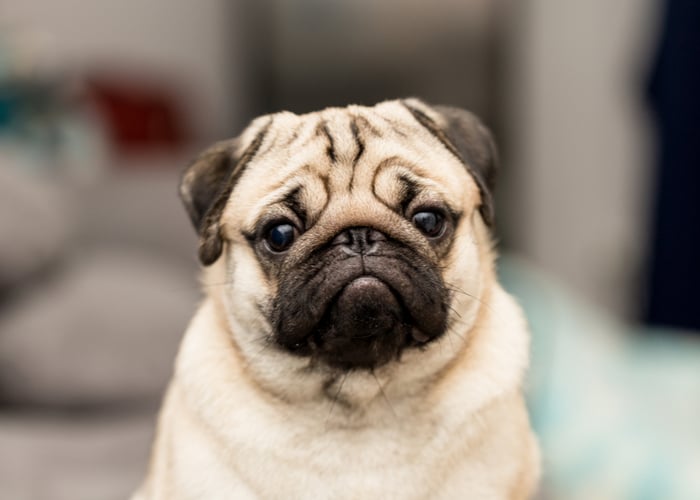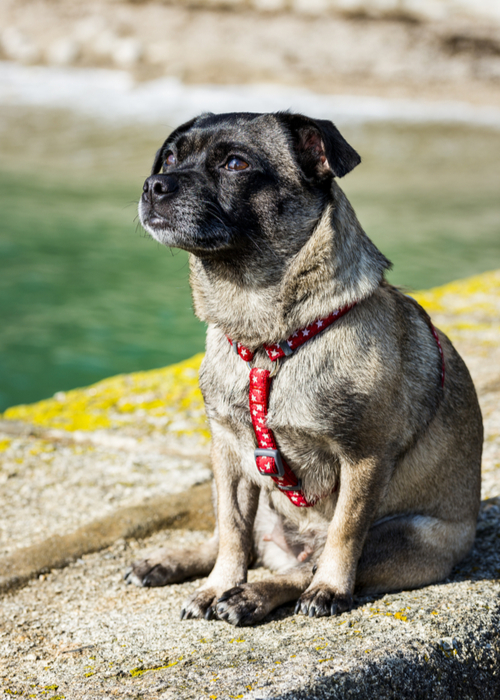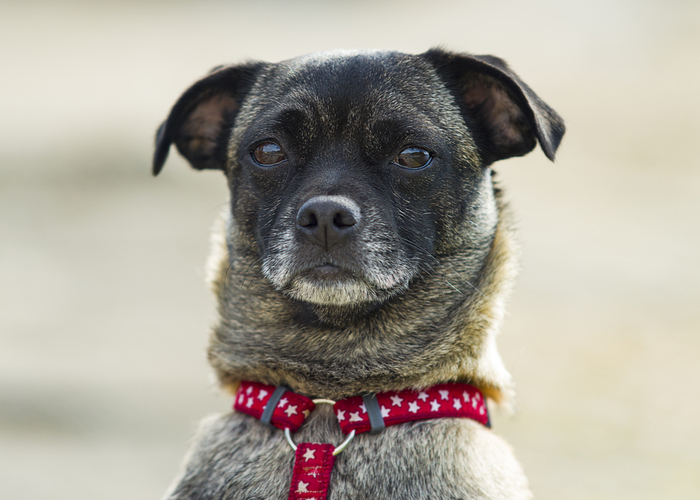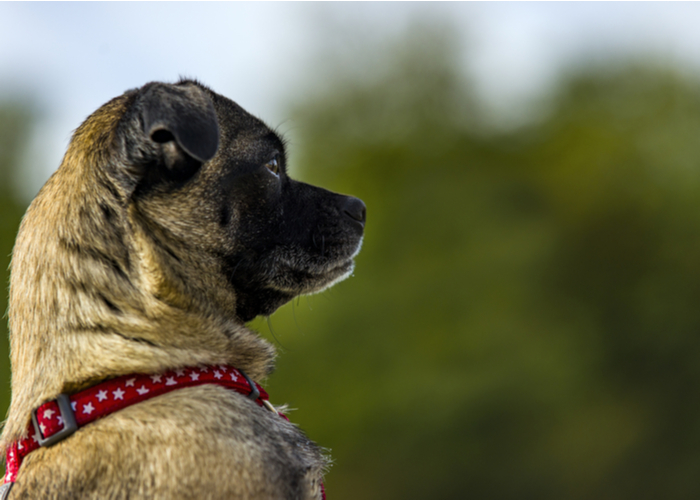Table of Contents
Despite the immense popularity, the Jug isn't a purebred dog but is an adorable mix of two popular breeds.
An equal blend of the spunky Jack Russell Terrier and the confident and calm Pug, almost every aspect of this dog can vary considerably.
Different personalities, exercise requirements, and appearances can sway significantly from one another. This makes it difficult to predict how one pup might turn out compared to the same breed.
This dog is a small breed with a sturdy body and short limbs. Their triangular ears will always flop sweetly to the side of their forehead, bringing their deep brown eyes to the front and center of every glance.
The Jug is often more streamlined than the standard Pug, although it's much less athletic than the Jack Russell.
Jug Dog Breed History
This breed was one of the original designer dogs thought to have originated in the early 1970s. This hybrid is far more recent than most other pedigree hybrids.
While the crossbreed has been around for decades, the characteristics of the Jug vary considerably between individual litters. With extensive variation in appearance and personality, the parent dog's personality heavily influences the overall dog.
To comprehensively understand the dog's personality quirks, here are overviews of both components (the Pug and the Jack Russell Terrier).
The Pug
Although the Pug has considerably increased in popularity over the last decade, many people are surprised to learn that this dog is classified as an ancient breed developed well over two thousand years ago.
The Chinese aristocracy bred these dogs as companion animals, seen as a status symbol.
The Pug arrived in Europe in the 1500s, becoming the official dog of the House of Orange in the Netherlands. The original breed from long ago would have looked considerably different than the one we know now.
It used to have a leaner body, pronounced snout, and much longer limbs. All pugs were originally of fawn coloring, with black coats coming into existence in the 1800s.
Recently, the Pug has come under criticism, with many veterinarians voicing concern over the health issues associated with the breed. Breathing is a big concern.
Many advocates suggest we try to accommodate longer snouts. Thankfully, out-breeding them with less brachycephalic dogs is another way to reduce the common health issues.
RELATED: 20 Most Ancient Dog Breeds
The Jack Russell Terrier
The name comes from an influential man in their early history, Reverend John Russell. The Jack Russell was initially designated to flush prey out of underground homes as a natural hunting dog.
This cheeky pup originated in England and was quickly exported to Australia, where the breed was further developed.
Initially, the Jack Russell was bred from other terrier breeds, including the Fox Terrier and the now extinct English White Terrier.
It hoped to establish a dog with courage and tenacity when on the hunt.
The Appearance of the Jug
While the Pug and the Jack Russell are both small dogs, the list of similarities ends there. These breeds are so extensively dissimilar that it likely comes as no surprise that Jugs aren't uniform in appearance.
Typically, these pups will have less muscular bodies and a coat wirier than a Jack Russell, yet more defined than a Pug.
All Jugs are known for their deep, expressive eyes, often a dark brown hue. Most Jugs will hold a broad and flat forehead that is typically wrinkled.
Their ears originate from the top of their head and hang down across the head, widely spaced apart. Occasionally, this breed may have rather bulbous eyes, commonly found with the Pug heritage.
The snout on a Jug will remain longer than the Pug and will often have less wrinkling overall. The tail may appear straight like the Jack Russell or curl over their back.
Most adult Jugs will measure between 28cm to 33cm, with an average weight of 6kg to 8kg. Unfortunately, obesity can pose a significant problem with this breed.
Jugs are known for their short and straight fur, with a wide array of coat colors. These colorings include white and brown, fawn, or black.
Generally, a Jug will have a fawn coat with dark black facial masks, with or without black ears.
Jug Temperament and Character
The Jug could inherit more genetics from the high-energy Terrier parent or the chilled-out comedian Pug parent. Most dogs will develop a unique combination of both parents, with excessive activity and plenty of quiet time.
Many of these dogs are people-oriented, forming close bonds with their family. A Jug will never want to miss out on any of the action.
The Jug is suited for virtually every age group, but they should be supervised by young children due to their rowdy nature when excited.
Occasionally, a Jug will have a higher prey drive than other dogs of the same breed, finding it difficult to resist temptation when left off-leash outside.
Although a high prey drive sounds alarming for other pets in the home, many dogs can learn to go harmoniously with other pets (provided they're exposed to them from an early age).
As such, it's imperative to provide a safe area to explore without potential menacing behavior from local wildlife.
Training Capabilities of a Jug
The Jug is known for its ability to test all boundaries and manipulate situations that benefit it. Owners must learn to remain firm with their pups and not accept clownish or disruptive behavior.
They may perform well in training sessions, although a few dogs will try to find their way out.
The Jug lives to entertain, but don't let the confidence and bold behavior fool you. This breed doesn't take well to criticism or punishment.
These dogs are seriously food driven, with many tasty treats luring complex tasks and cues. As such, trainers are advised to stick with positive reinforcement methods.
Overall Health of the Jug
While mixing two pedigree dogs will always reduce the risk of genetic health issues, there are inevitably a few health conditions the Jug may experience throughout its lifetime.
These risks can vary significantly, depending on the overall health and well-being of the parental lineage. Health risks associated with the Jug include:
Keratoconjunctivitis Sicca (KCS)
Commonly referred to as ‘Dry Eye,' this condition is a painful state that often occurs in both eyes. Dry eye stems from a lack of tear production but can progress over time.
Unfortunately, dry eyes may appear normal overall, or they may appear as lackluster or dull. Many pet owners indicate these dogs seem to have lost the sparkle in their eyes.
A pup with KCS will always be prone to corneal ulceration and eye infections. This requires line-long eye drops to help manage the condition.
As the Jug is predisposed to this condition, it's imperative to find a veterinarian familiar with the disease.
A particular diagnostic test known as the ‘Schirmer Tear Test' will quickly and effortlessly measure a dog's tear production, which should be carried out annually with a health check.
Allergic Skin Disease
While virtually every breed of dog can become prone to allergic skin disease, it appears the Jug is over-represented for this condition.
Typically, dogs with this condition will start showing symptoms and signs between one and six years of age.
The signs of allergic skin disease can vary but often include paw licking, generalized scratching, and facial rubbing.
The animal could eventually become so itchy that it may even break the skin, leaving it red, infected, and raw. Should the dog develop an infection, it's essential to receive prompt medical attention.
Occasionally, it is possible to determine what the dog is allergic to. If the allergen is identified, the condition may resolve by simply avoiding the trigger or with a course of immunotherapy to eliminate the allergy.
For most canines, allergic skin disease is something to manage throughout their lifetime continuously.
Obesity Concerns
As the Jug is food-driven, many of this dog breed quickly become overweight or obese. This condition compiles when the breed embraces the lazy, laid-back personality of the Pug.
Although this condition isn't inevitable, it can be challenging to manage. Owners can prevent obesity from occurring by limiting the dog's calorie intake while simultaneously increasing the exercise requirements.
Many male dogs will put weight on after the neutering surgery, as the metabolism slows slightly.
Additionally, the Jug occasionally becomes less active after the surgery, so switching to a lower-calorie food can benefit them.
Understanding Exercise and Activity
While every Jug will have different activity and exercise requirements, the exact exercise demand will depend on the potential to take after the active Terrier parent or more sedentary Pug parent.
A good rule of thumb is that daily activity of forty-five minutes to an hour should be sufficient to keep these dogs content and active.
Ideal Activities For Your Jug
The Jug is a fairly active breed, meaning you'll want to offer a fenced yard where your dog can run around. Unfortunately, this doesn't substitute taking your dog for walks at least once daily.
If you're not walking your dog often enough, they're more likely to develop “small dog syndrome,” where they struggle with dominance and stubbornness.
Unfortunately, they'll also become less likely to respond to commands.
Playtime is essential for your dog's natural desire to chase. If you're looking for activities to engage your pup, consider playing a game of hide and seek, throwing a ball for him to chase, or playing actively at the dog park.
An under-stimulated dog can become easily bored, leaving it to chase its tail. Dogs that don't receive enough exercise are also more inclined to struggle with problematic behaviors like barking, digging, and chewing.
Invest in a few high-quality toys for your Jug, including a ball, rope, and other stimulating options. Interesting noises or textures can be highly beneficial, providing mental stimulation and physical interaction.
For those wanting to remain budget-friendly, an empty water bottle in an old sock can provide great fun for your pup (as they love the sound of the plastic in their jaws).
When picking out toys, avoid anything soft and “shred-able.” These toys may encourage destructive habits while becoming frustrated simultaneously.
Natural options like deer antlers are attractive options for Jugs that love to chew. These products are natural and typically don't split.
Jug Grooming Requirements
The Jug is a low-maintenance dog for grooming, requiring very little upkeep for its owners.
Occasionally, you may need to brush their fur weekly, to remove excess fur from their coat. Periodically check this breed's ears for build-up or signs of infection.
This breed can become prone to ear infections with constantly hanging ears if left unattended. Wiping the ear gently with a soft cloth can remove excess wax and debris.
Finally, monitor your Jug for any dental issues as the dog ages. Many Pugs are prone to an underbite, which can leave the mouth open continuously.
As such, bacteria that cause dental decay can cause bad breath and plaque to build if left untreated. Offering plenty of natural substances to help keep the teeth and gums clean is often enough to offset the risk of dental issues long-term, but regularly inspecting the mouth is important too.
If you notice any problems within the mouth, contact your vet immediately for further instruction. Many dental issues will require correction from the vet.
Thorough cleaning, plaque removal, and extractions are resolutions, depending on the problem and the age of your Jug.
Jug Dog Breed Conclusion
The Jug is a playful mixed-breed dog that loves socializing and romping with the family.
These dogs have enough stamina to keep up on daily hikes and walks while still enjoying some downtime curled up at your feet.
With a few toys, a fenced-in yard, and plenty of outdoor time, the Jug will happily spend their days playing. Just as the dog's physical appearance can vastly change, so too can the pup's personality.
Genetics will always strongly influence the Jug's personality but will always be unpredictable overall.
If you're looking for a beautiful, goofy dog that makes you smile, the Jug may be the perfect option.



















